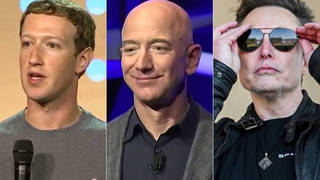
Related
Guests
- John Nicholsa political writer for The Nation and the author of the book, Uprising: How Wisconsin Renewed the Politics of Protest, from Madison to Wall Street.
Links
- “Who Got the Most Votes in Tuesday's Primaries? Not Mitt Romney.” By John Nichols (The Nation blog, April 4, 2012)
- “Why Scott Walker Is Avoiding Mitt Romney.” By John Nichols (The Nation blog, April 2, 2012)
- Follow John Nichols on Twitter: @NicholsUprising
- “Uprising: How Wisconsin Renewed the Politics of Protest, from Madison to Wall Street.” By John Nichols (Nation Books, 2012)
- Watch additional Democracy Now! coverage of the 2012 election
As Mitt Romney sweeps Tuesday’s primaries in Wisconsin, Maryland and Washington, D.C., we go to Madison to speak with The Nation’s John Nichols. He notes Romney has steered further toward the right wing as his campaign progresses. In Wisconsin, Romney channeled the anti-union policies of embattled Wisconsin Governor Scott Walker. “In many cases, though he didn’t appear for photographs with Scott Walker, Mitt Romney was sounding like Scott Walker as he attacked 'big union bosses' and talked about how he wanted to take away labor rights if he’s elected president,” Nichols says. He also discusses Romney’s support for the controversial budget plan by House Budget Committee Chairman Paul Ryan (R-WI), which passed the House last week and includes deep cuts to domestic programs. [includes rush transcript]
Transcript
NERMEEN SHAIKH: Mitt Romney made a clean sweep of the Wisconsin, D.C. and Maryland primaries Tuesday, bringing him much closer to the Republican presidential nomination. The former Massachusetts governor took aim at President Obama’s economic policies during his victory speech in Milwaukee, Wisconsin.
MITT ROMNEY: Out-of-touch liberals like Barack Obama say they want a strong economy, but in everything they do, they show they don’t like business very much. But the economy, of course, is simply the product of all the businesses in the nation added together. So it’s a bit like saying you like an omelet, but you don’t like eggs.
NERMEEN SHAIKH: Earlier in the day, President Obama mentioned Romney by name for the first time during a major address, suggesting the White House now sees the millionaire former executive as the effective Republican nominee. Obama criticized Romney’s support of the new House Republican budget plan, saying it was really, quote, “thinly veiled social Darwinism.”
PRESIDENT BARACK OBAMA: One of my potential opponents, Governor Romney, has said that he hoped a similar version of this plan from last year would be introduced as a bill on day one of his presidency. He said that he’s very supportive of this new budget. And he even called it “marvelous,” which is a word you don’t often hear when it comes to describing a budget.
AMY GOODMAN: Meanwhile, Romney’s sweep of three more primaries added to mounting pressure for conservative Rick Santorum to pull out of the race. He has vowed to continue until at least May, when he hopes to pick up victories in Texas, Arkansas, Kentucky and North Carolina, and possibly later this month in his home state of Pennsylvania.
For more about the primaries, we’re going to Madison, Wisconsin, to talk with John Nichols, political writer for The Nation, author of Uprising: How Wisconsin Renewed the Politics of Protest, from Madison to Wall Street.
John, welcome to Democracy Now! One thing we noticed is there weren’t any pictures of the leading Republican presidential contenders with the Republican governor or Wisconsin, Governor Walker.
JOHN NICHOLS: Very astute observation, Amy. The Walker team in Wisconsin is very, very concerned, of course, about the fact that the Governor is being recalled. He will face a June 5 election in which he could be removed from office. And so, they were studiously careful about keeping the Governor in different places from Rick Santorum and Mitt Romney. By the same token, there is some evidence that Santorum and Romney weren’t all that troubled by the distance, either.
Here’s the political breakdown on it. Walker has to reach out to moderates and independent voters, if he’s going to have any chance whatsoever of hanging onto his job, so he doesn’t need to be seen with candidates who are running far to the right on social issues and on economic issues. By the same token, Walker is a vulnerable Republican. And so, especially in the case of Mitt Romney, being photographed a lot with Scott Walker, only to have Scott Walker turn around and be defeated a month or so later, is not necessarily a positive, either. So there was a very delicate dance in Wisconsin. Romney and Santorum both endorsed Walker’s agenda. In fact, they were quite strongly supportive of the anti-union positions that the Governor has taken. By the same token, there was not—you’re not going to find a lot of photographs of Romney and Walker or Santorum and Walker.
NERMEEN SHAIKH: I want to go to a short clip of Mitt Romney praising Republican Governor Scott Walker in Wisconsin while campaigning with Republican Congress Member Paul Ryan there on Monday. Walker is, of course, facing a recall.
MITT ROMNEY: I got an email from the Governor, who is a real champion, by the way. Your governor is a real—a real fighter, great leader. And I had the chance to speak at an event, a Lincoln Day dinner, and I told an experience of mine from the Olympics. And he sent me an email and said, “You ought to do that more often.”
NERMEEN SHAIKH: So that was Mitt Romney with Paul Ryan. John Nichols, your comment?
JOHN NICHOLS: Yeah, I think that’s a really big deal, the Romney-Ryan connection, because where you didn’t see a lot of photographs with Mitt Romney and Scott Walker, you saw Ryan at Romney’s side every day from last Friday. Ryan did the better part of a dozen appearances with Mitt Romney and was really the dynamic figure at those Romney events. Now, this is a big deal, because Ryan is a sort of a hot-button character in our politics. Polling suggests that a large number of Americans are very uncomfortable not just with Ryan’s budget proposals, which would assault Medicare, Medicaid and Social Security, but also with Ryan himself. They see him as too edgy a figure.
So why did Mitt Romney really get welded right next to him? Why did they link up so closely? Romney needed Ryan to secure the conservative base in Wisconsin. If you look at the final figures in Wisconsin, Romney only beat Rick Santorum by about 4 percent of the vote. It was actually a very close result. Rick Santorum won most of the rural counties in the state and ran very, very well in the west and the north of the state. So, Romney really needed some sort of boost to get a clear finish. He relied on Ryan very much and made a lot of statements that aligned himself extremely closely with Paul Ryan. Now, in the Wisconsin primary, that was helpful. In November, if Romney is the eventual nominee, the association with Ryan could be a very volatile one. I hear people talking about the possibility that Paul Ryan might be Mitt Romney’s vice-presidential nominee. If that happens, you’re going to define this as the most economically right-wing ticket since Herbert Hoover was running for re-election in 1936.
NERMEEN SHAIKH: But do you see Mitt Romney—
JOHN NICHOLS: Or 1932, I apologize.
NERMEEN SHAIKH: Sorry, John Nichols, do you see Mitt Romney as moving more to the right as the campaign progresses?
JOHN NICHOLS: There’s simply no question that Mitt Romney has moved dramatically to the right as this campaign has progressed. I’ve followed him, you know, since the middle of last year. And, in fact, we’ve spoken on this show from Iowa and, I think, perhaps some of the other early states. And, you know, it’s been extremely fascinating to watch Romney try, at least in the early primaries and caucuses, to maintain a measure of moderation, to think about that fall race, not just the primaries he was in. But as the primary process dragged out and he has—he had to struggle to secure the nomination, he was forced to move further and further to the right.
He’s certainly done so on some social issues and on some religion issues. Yesterday he was condemning the President, saying the President wanted to make America a, quote-unquote, “secular” nation. And he’s also gotten into some of the abortion and contraceptive debates, that he really didn’t want to be in. And most importantly, he has outlined a militantly right-wing economic agenda, embracing much of the Ryan budget, which is something he didn’t do initially, and also really bringing out some of the harshest anti-union rhetoric that I’ve ever heard from a presidential candidate in either party. In fact, in many cases, though he didn’t appear for photographs with Scott Walker, Mitt Romney was sounding like Scott Walker as he attacked, quote-unquote, “big union bosses” and talked about how he wanted to take away labor rights if he’s elected president.
AMY GOODMAN: Wisconsin Republican Congressman Paul Ryan’s controversial budget plan was passed by the House last week, included sweeping cuts to domestic programs, including so-called “entitlement” programs—Medicare, Medicaid, Social Security. He and Republican presidential hopeful Mitt Romney appeared on Sean Hannity’s Fox News program together late last week.
REP. PAUL RYAN: If we don’t deal with these drivers of our debt, then these programs go bankrupt, Sean. Then the promises that were made to current seniors, they become broken promises. See, our government, Republicans and Democrats, for decades have been making empty promises to people, and if we have a debt crisis, those quickly become broken promises. So we’re saying you need to reform these programs if you’re going to save these programs, and if you’re going to get rid of this debt that is plaguing our economy. Our debt is bigger than our economy today. And it’s getting worse, and it’s going to crash our economy, if we allow us to continue on the same glide path we’re on today. And so, this is why I’ve been pushing these issues. This is why we have pushed these issues as House Republicans. And the reason I’m excited about Mitt Romney’s candidacy is because it’s very clear to me, from all of our interactions, that he understands this threat to our country, and he also understands the kind of courage we need to employ to get this done and to fix these problems before they get out of our control.
AMY GOODMAN: So that was Republican Congress Member Paul Ryan of Wisconsin, appearing with Mitt Romney on Fox News. John Nichols, President Obama is taking on Ryan’s budget plan and also mentioned Romney for the first time publicly, you know, suggesting he knows he is going up against Romney.
JOHN NICHOLS: There’s simply no question that President Obama is now quite clear that he’ll be running against Mitt Romney in the fall. But when he went after Romney, it’s very notable that he did focus on Ryan. And I think this is going to be a real dynamic of the fall campaign. Romney had to do things to get the Republican nomination that have now identified him clearly as a strong backer of the Ryan agenda. That’s a dangerous place to be politically, and I think the President recognizes it. That’s why he’s bringing Ryan up. That’s why he’s making the linkage, because, you know, despite the jumble of statements and kind of outrageous claims that Ryan made in that clip you just played, it should be remembered that Medicare, Medicaid and Social Security are successful programs. They run well, and they’re very well loved. The polling on them is incredibly positive. People don’t want those programs to be radically altered. And yet, Paul Ryan is proposing radical alterations in those programs, so that they would be completely different from how they operate now and much more tied to Wall Street speculation, to the insurance companies.
At the same time, Paul Ryan talks a very good line about being opposed to debts and deficits, and yet, if you look at his budget, it balances the federal budget far later in the future than with the Congressional Progressive Caucus budget. That’s because Paul Ryan is unwilling to put fair taxes on wealthy people or corporations. And so, he puts all of the burden of his budget reforms on working families, on the elderly, on the disabled. And so, it gives President Obama and, I think, the Democrats a great deal of space to talk about that Ryan budget, to criticize Romney for his embrace of it. And I think you really did see the framing out of the fall campaign in a series of interactions over the last couple days, both the statements from Romney and Ryan, and also the statements from President Obama.
NERMEEN SHAIKH: John Nichols, can you talk a little about the role of campaign finance in ensuring Romney’s win? He apparently spent something like 10 times as much as Santorum in each of these three primary races in D.C., Maryland and in Wisconsin?
JOHN NICHOLS: Yeah, it’s just mind-boggling. You cannot emphasize the extent to which Mitt Romney has bought this nomination. And there’s a couple things that are important to remember here. At this very late stage in the process, and we are—we’re into April. This is a point where, in most cases, not all, but in most cases, Republican presidential nomination campaigns are well settled. And so, Romney’s still fighting to get the nomination. There’s a tremendous amount of evidence that Republicans don’t really like the guy. In primary after primary, caucus after caucus, he doesn’t get anywhere near 50 percent of the vote. In fact, in Wisconsin, 57 percent of Republican primary voters voted for someone other than Mitt Romney. So he really has to invest immense amounts of money simply to get a plurality vote in Republican primaries, even at this late stage. In Wisconsin, the spending ratio was, as you suggest, something in the range of 10 to one. Some people have suggested that when you combine Mitt Romney’s campaign spending with his super PAC spending, that it actually would go to a far higher ratio, much more than 10 to one. But there’s simply no question, he poured money into Wisconsin in order to assure that he could get a victory. He also spent substantially in Maryland and, to a lesser extent, in D.C.
But at the end of the day, the story of Mitt Romney, almost certainly now, winning the Republican nomination will be a story of massive spending, of directing of huge amounts of money into attacks on his opponents and, frankly, into efforts to suppress the turnout by his opponents. I think you’re seeing a pattern there that’s going to play out into the fall. You should expect the Romney campaign to run a very negative attack, obviously, on President Obama—that’s not uncommon—but also to see that attack backed up by massive super PAC spending, made possible, in many cases, by the Citizens United ruling that essentially said corporations and the wealthy can spend whatever they want to buy election results.
NERMEEN SHAIKH: Very quickly, John Nichols, before we conclude, could you say a little about Governor Scott Walker’s recall election, which is scheduled for June 5th?
JOHN NICHOLS: Sure. I mean, the amazing thing about the Wisconsin primary fight was that while Romney and Santorum were trying to get attention, all of the attention in Wisconsin is on the recall battle. It was certified on last Friday. That means that we now know the dates, the schedule. There will be a May 8th Democratic primary. There are at least four prominent Democrats who have gotten into that race. And then there will be a June 5th general election between Governor Walker and the Democratic nominee. There will also be races for lieutenant governor and four State Senate seats. So this will be the most wide-ranging recall vote in the history of the United States, one that has the potential to remove a governor and to shift control of the state legislature. And it all is driven by, or began with, a fight over austerity and labor rights. So it really is a remarkable economic and political battle playing out with immense amounts of grassroots energy in Wisconsin.
AMY GOODMAN: And the court ruling on the law?
JOHN NICHOLS: The court ruling—yeah, there was a court ruling that came through late Friday, and it reinforced what many of the union folks have been saying for a long time. Elements of Governor Walker’s anti-labor law, which was pushed through the legislature middle of last year, were found to be unconstitutional. And the determination was that the Governor and his supporters had unfairly and unconstitutionally taken away some basic union rights, including the right to collect dues and the right to have unions exist as permanent entities. They were going to be forced to have reconstitution every year. They had to have a new election. That was an incredibly burdensome challenge for unions. The court threw that out. It will still be battled in the courts, but it served to reemphasize that much of what the Governor did was not just politically controversial, it was also legally inappropriate.












Media Options